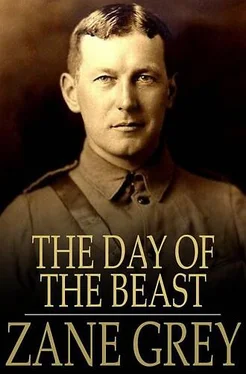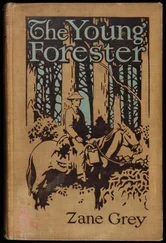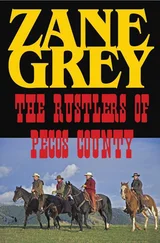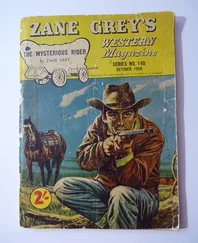Zane Grey - The Day of the Beast
Здесь есть возможность читать онлайн «Zane Grey - The Day of the Beast» весь текст электронной книги совершенно бесплатно (целиком полную версию без сокращений). В некоторых случаях можно слушать аудио, скачать через торрент в формате fb2 и присутствует краткое содержание. Жанр: Старинная литература. Описание произведения, (предисловие) а так же отзывы посетителей доступны на портале библиотеки ЛибКат.
- Название:The Day of the Beast
- Автор:
- Жанр:
- Год:неизвестен
- ISBN:нет данных
- Рейтинг книги:4 / 5. Голосов: 1
-
Избранное:Добавить в избранное
- Отзывы:
-
Ваша оценка:
- 80
- 1
- 2
- 3
- 4
- 5
The Day of the Beast: краткое содержание, описание и аннотация
Предлагаем к чтению аннотацию, описание, краткое содержание или предисловие (зависит от того, что написал сам автор книги «The Day of the Beast»). Если вы не нашли необходимую информацию о книге — напишите в комментариях, мы постараемся отыскать её.
The Day of the Beast — читать онлайн бесплатно полную книгу (весь текст) целиком
Ниже представлен текст книги, разбитый по страницам. Система сохранения места последней прочитанной страницы, позволяет с удобством читать онлайн бесплатно книгу «The Day of the Beast», без необходимости каждый раз заново искать на чём Вы остановились. Поставьте закладку, и сможете в любой момент перейти на страницу, на которой закончили чтение.
Интервал:
Закладка:
The spring of a panther was in Margaret's action as she began to repace the room. All her blood quickened to the thought suggested by her husband's soft voice. In the mirror she saw a crimsoned face and shamed eyes from which she turned away.
All the pain and repression, the fight and bitter resignation and trained indifference of the past months were as if they had never been. This was her hour of real agony; now was the time to pay the price. Pride, honor, love never smothered, reserve rooted in the very core of a sensitive woman's heart, availed nothing. Once again catching sight of her reflection in the mirror she stopped before it, and crossing her hands on her heaving breast, she regarded herself with scorn. She was false to her love, she was false to herself, false to the man to whom she had sold herself. “Oh! Why did I yield!” she cried. She was a coward; she belonged to the luxurious class that would suffer anything rather than lose position. Fallen had she as low as any of them; gold had been the price of her soul. To keep her position she must marry one man when she loved another. She cried out in her wretchedness; she felt in her whole being a bitter humiliation; she felt stir in her a terrible tumult.
Margaret wondered how many thousands of girls had been similarly placed, and pitied them. She thought of the atmosphere in which she lived, where it seemed to her every mother was possessed singularly and entirely of one aim, to marry her daughter as soon as possible to a man as rich as possible. Marrying well simply meant marrying money. Only a few days before her mother had come to her and said: “Mrs. Fisher called and she was telling me about her daughter Alice. It seems Alice is growing very pretty and very popular. She said she was afraid Alice had taken, a liking to that Brandeth fellow, who's only a clerk. So Mrs. Fisher intends taking Alice to the seashore this summer, to an exclusive resort, of course, but one where there will be excitement and plenty of young gentlemen.”
At the remembrance Margaret gave a little contemptuous laugh. A year ago she would not have divined the real purport of her mother's words. How easy that was now! Mrs. Fisher had decided that as Alice was eighteen it was time a suitable husband was found for her. Poor Alice! Balls, parties, receptions there would be, and trips to the seashore and all the other society manoeuvers, made ostensibly to introduce Alice to the world; but if the truth were told in cold blood all this was simply a parading of the girl before a number of rich and marriageable men. Poor Harry Brandeth!
She recalled many marriages of friends and acquaintances. With strange intensity of purpose she brought each one to mind, and thought separately and earnestly over her. What melancholy facts this exercise revealed! She could not recall one girl who was happy, perfectly happy, unless it was Jane Silvey who ran off with and married a telegraph operator. Jane was still bright-eyed and fresh, happy no doubt in her little house with her work and her baby, even though her people passed her by as if she were a stranger. Then Margaret remembered with a little shock there was another friend, a bride who had been found on her wedding night wandering in the fields. There had been some talk, quickly hushed, of a drunken husband, but it had never definitely transpired what had made her run out into the dark night. Margaret recollected the time she had seen this girl's husband, when he was drunk, beat his dog brutally. Then Margaret reflected on the gossip she never wanted to hear, yet could not avoid hearing, over her mother's tea-table; on the intimations and implications. Many things she would not otherwise have thought of again, but they now recurred and added their significance to her awakening mind. She was not keen nor analytical; she possessed only an ordinary intelligence; she could not trace her way through a labyrinth of perplexing problems; still, suffering had opened her eyes and she saw something terribly wrong in her mother's world.
Once more she stopped pacing her room, for a step in the hall arrested her, and made her stand quivering, as if under the lash.
“I won't!” she breathed intensely. Swiftly and lightly she sped across her room, opened a door leading to the balcony and went out, closing the door behind her softly.
Mr. Maynard sat before the library fire with a neglected cigar between his fingers. The events of the day had stirred him deeply. The cold shock he had felt when he touched his daughter's cheek in the accustomed good-night kiss remained with him, still chilled his lips. For an hour he sat there motionless, with his eyes fixed on the dying fire, and in his mind hope, doubt and remorse strangely mingled. Hope persuaded him that Margaret was only a girl, still sentimental and unpoised. Unquestionably she had made a good marriage. Her girlish notions about romance and love must give way to sane acceptance of real human life. After all money meant a great deal. She would come around to a sensible view, and get that strange look out of her eyes, that strained blighted look which hurt him. Then he writhed in his self-contempt; doubt routed all his hope, and remorse made him miserable.
A hurried step on the stairs aroused Mr. Maynard. Swann came running into the library. He was white; his sharp featured face wore a combination of expressions; alarm, incredulity, wonder were all visible there, but the most striking was mortification.
“Mr. Maynard, Margaret has left her room. I can't find her anywhere.”
The father stared blankly at his son-in-law.
Swann repeated his statement.
“What!” All at once Mr. Maynard sank helplessly into his chair. In that moment certainty made him an old broken man.
“She's gone!” said Swann, in a shaken voice. “She has run off from me. I knew she would; I knew she'd do something. I've never been able to kiss her—only last night we quarreled about it. I tell you it's—”
“Pray do not get excited,” interrupted Mr. Maynard, bracing up. “I'm sure you exaggerate. Tell me what you know.”
“I went to her room an hour, two hours ago, and knocked. She was there but refused me admittance. She spoke sharply—as if—as if she was afraid. I went and knocked again long after. She didn't answer. I knocked again and again. Then I tried her door. It was not locked. I opened it. She was not in the room. I waited, but she didn't come. I—I am afraid something is—wrong.”
“She might be with her mother,” faltered Mr. Maynard.
“No, I'm sure not,” asserted Swann. “Not to-night of all nights. Margaret has grown—somewhat cold toward her mother. Besides Mrs. Maynard retired hours ago.”
The father and the husband stole noiselessly up the stairs and entered Margaret's room. The light was turned on full. The room was somewhat disordered; bridal finery lay littered about; a rug was crumpled; a wicker basket overturned. The father's instinct was true. His first move was to open the door leading out upon the balcony. In the thin snow drifted upon this porch were the imprints of little feet.
Something gleamed pale blue in the light of the open door. Mr. Maynard picked it up, and with a sigh that was a groan held it out to Swann. It was a blue satin slipper.
“Heavens!” exclaimed Swann. “She's run out in the snow—she might as well be barefooted.”
“S-sh-h!” warned Mr. Maynard. Unhappy and excited as he was he did not forget Mrs. Maynard. “Let us not alarm any one.”
“There! See, her footsteps down the stairs,” whispered Swann. “I can see them clear to the ground.”
“You stay here, Swann, so in case Mrs. Maynard or the servants awake you can prevent alarm. We must think of that. I'll bring her back.”
Mr. Maynard descended the narrow stairway to the lower porch and went out into the yard. The storm had ceased. A few inches of snow had fallen and in places was deeper in drifts. The moon was out and shone down on a white world. It was cold and quiet. When Mr. Maynard had trailed the footsteps across his wide lawn and saw them lead out into the street toward the park, he fell against a tree, unable, for a moment, to command himself. Hope he had none left, nor a doubt. On the other side of the park, hardly a quarter of a mile away, was the river. Margaret had gone straight toward it.
Читать дальшеИнтервал:
Закладка:
Похожие книги на «The Day of the Beast»
Представляем Вашему вниманию похожие книги на «The Day of the Beast» списком для выбора. Мы отобрали схожую по названию и смыслу литературу в надежде предоставить читателям больше вариантов отыскать новые, интересные, ещё непрочитанные произведения.
Обсуждение, отзывы о книге «The Day of the Beast» и просто собственные мнения читателей. Оставьте ваши комментарии, напишите, что Вы думаете о произведении, его смысле или главных героях. Укажите что конкретно понравилось, а что нет, и почему Вы так считаете.












